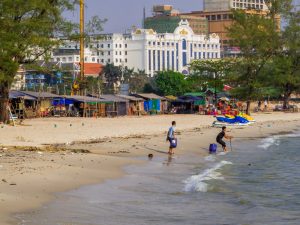Mainland Southeast Asia once ranked among the top tourist regions in the world, bolstering economies and employing millions, but a rot set in with the rise of authoritarian regimes and a preference for Chinese currency over and above all others.
COVID-19 dealt the final blow, as the Chinese visitors evacuated and governments were left scrambling to rebuild post-pandemic what was once an integral part of their economy.
Human trafficking, spawned from Cambodia’s abandoned casino industry, then grabbed the headlines and a coup d’etat in Myanmar only added to the atrocious image presented abroad.
Cambodian authorities, who spent the better part of the past four years jailing opposition political figures, were hit. Lao’s economy, burdened by massive debt, was crushed. Thailand is struggling and military-ruled Myanmar is a write-off.
Worsening Southeast Asia’s already dreadful image is a Chinese-made movie – which had to pass the state censors – and the latest report, released on Tuesday, by the United Nations Office on Drugs and Crime (UNODC), both of which highlight the region’s human trafficking crisis.
The UNODC report confirmed what most people already know about the scourge of human trafficking: that it emerged from casinos initially founded in Cambodia to serve Chinese patrons in online gambling and in the VIP junket tour market.
As the pandemic took hold, deserted casinos were redesigned into “scam parks,” a shift that was already in the planning stages ahead of COVID-19. Since the pandemic ebbed, human trafficking has been pushed into the harder-to-reach parts of eastern and southern Myanmar. Thailand remains a source and transit country.
That report landed after the August release of “No More Bets,” a fictional movie about a Chinese pair who are deceived by offers of well-paid work abroad, fall prey to traffickers, and are forced to work in the online scam mills by criminal syndicates.
“No More Bets” was promoted in China under the slogan “one more viewer, one less fraud victim.” The film has topped the box office. And more importantly, it must have had official state approval – hardly a vote of confidence for China’s closest ally in Southeast Asia, Cambodia.
Chinese tourists, like anyone else, are quite capable of voting with their feet. Alternative destinations, like Macau, are back in vogue and Beijing is encouraging its foreign investors to return and spend their money at home.
Cambodians in particular are dreaming if they still believe that Chinese investors and tourists will make a miraculous return with bucket loads of cash that they will shower upon the elites – even if the basis of their special relationship has always been for strategic purposes.
Confirming “No More Bets” and the UNODC reports is the Office of the U.N. High Commissioner for Human Rights. It said in a report last month that at least 120,000 people in Myanmar and about another 100,000 in Cambodia are potentially being held against their will and forced by syndicates to work online scams.
Within the Association of Southeast Asian Nations (ASEAN), Cambodia, Laos, Myanmar, and Vietnam make up what is known as the CLMV club – the last group of countries to join the bloc once noted for staid unity and as a bulwark against communism.
Only Vietnam has stayed a course that can be traced back to the end of the Cold War, and its trade figures with the United States should be the envy of mainland Southeast Asian countries. Official figures are opaque, but their dependency on Beijing’s largesse is well documented.
Vietnamese exports to the U.S. are nearing $100 billion a year compared with about $58 billion to China. There’s an added gloss in that Vietnam exports a further $42 billion a year to U.S. allies Japan and South Korea. It also runs a trade surplus with the U.S. and a deficit with China.
That’s why U.S. President Joe Biden visited Hanoi earlier this month, and has opened talks for the largest ever transfer of military hardware between the two countries.
Add into the mix the dreadful image of Vietnam’s neighbors abroad and their pro-China policies, then perhaps it’s not surprising, according to ASEAN sources, that Vietnam wants out of the CLMV club.

































